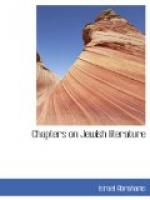BIBLIOGRAPHY
GAONIM.
Graetz.—III, 4-8.
Steinschneider.—Jewish Literature, p. 25.
CHAPTER VI
THE KARAITIC LITERATURE
Anan, Nahavendi, Abul-Faraj,
Salman, Sahal, al-Bazir, Hassan,
Japhet, Kirkisani, Judah
Hadassi, Isaac Troki.
In the very heart of the Gaonate, the eighth century witnessed a religious and literary reaction against Rabbinism. The opposition to the Rabbinite spirit was far older than this, but it came to a head under Anan, the son of David, the founder of Karaism. Anan had been an unsuccessful candidate for the dignity of Exilarch, and thus personal motives were involved in his attack on the Gaonim. But there were other reasons for the revolt. In the same century, Islam, like Judaism, was threatened by a fierce antagonism between the friends and the foes of tradition. In Islam the struggle lay between the Sunnites, who interpreted Mohammedanism in accordance with authorized tradition, and the Shiites, who relied exclusively upon the Koran. Similarly, in Judaism, the Rabbinites obeyed the traditions of the earlier authorities, and the Karaites (from Kera, or Mikra, i.e. “Bible”) claimed the right to reject tradition and revert to the Bible as the original source of inspiration. Such reactions against tradition are recurrent in all religions.
Karaism, however, was not a true reaction against tradition. It replaced an old tradition by a new one; it substituted a rigid, unprogressive authority for one capable of growth and adaptation to changing requirements. In the end, Karaism became so hedged in by its supposed avoidance of tradition that it ceased to be a living force. But we are here not concerned with the religious defects of Karaism. Regarded from the literary side, Karaism produced a double effect. Karaism itself gave birth to an original and splendid literature, and, on the other hand, coming as it did at the time when Arabic science and poetry were attaining their golden zenith, Karaism aroused within the Rabbinite sphere a notable energy, which resulted in some of the best work of medieval Jews.
Among the most famous of the Karaite authors was Benjamin Nahavendi, who lived at the beginning of the ninth century, and displayed much resolution and ability as an advocate of free-thought in religion. Nahavendi not only wrote commentaries on the Bible, but also attempted to write a philosophy of Judaism, being allied to Philo in the past and to the Arabic writers in his own time. At the end of the ninth century, Abul-Faraj Harun made a great stride forwards as an expounder of the Bible and as an authority on Hebrew grammar.
During the ninth and tenth centuries, several Karaites revealed much vigor and ability in their controversies with the Gaonim. In this field the most distinguished Karaitic writers were Salman, the son of Yerucham (885-960); Sahal, the son of Mazliach (900-950); Joseph al-Bazir (flourished 910-930); Hassan, the son of Mashiach (930); and Japhet, the son of Ali (950-990).




